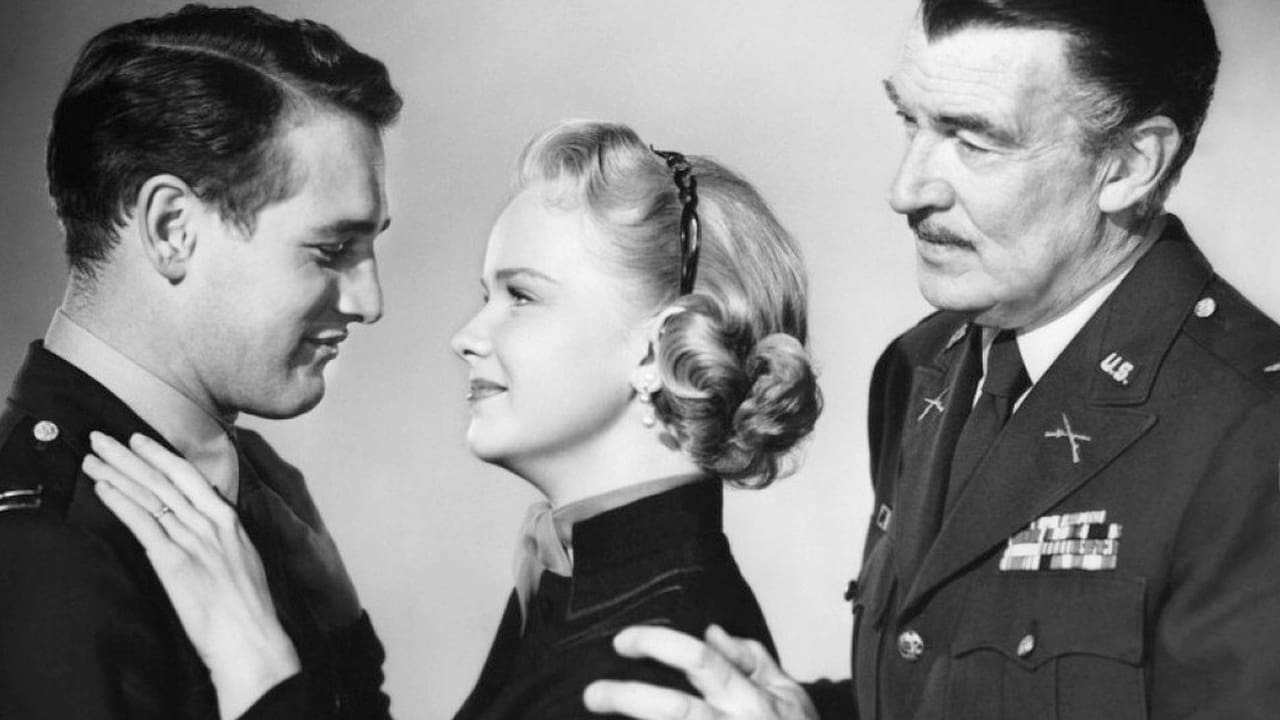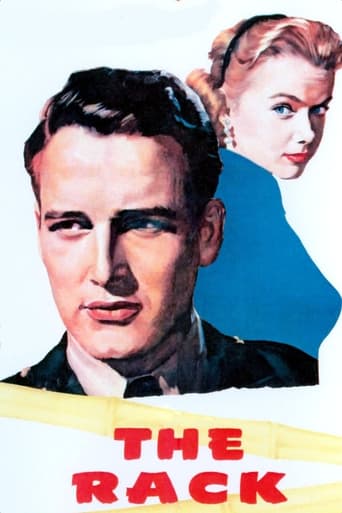

Load of rubbish!!
... View MoreDon't listen to the negative reviews
... View MoreThe film was still a fun one that will make you laugh and have you leaving the theater feeling like you just stole something valuable and got away with it.
... View MoreThis film is so real. It treats its characters with so much care and sensitivity.
... View MoreDirected by Arnold Laven, this Stewart Stern screenplay was based on a teleplay by Rod Serling. It stars Paul Newman as a Korean War veteran who returns home after years as a P.O.W. to face a court martial trial for collaborating with the enemy.It's a very good drama with an excellent, credible performance by Newman and the rest of the film's notable cast including Wendall Corey as the initially reluctant yet duty bound prosecutor, Walter Pidgeon as Newman's stern "by the book" Army Colonel father, Edmond O'Brien as Newman's more than capable defense attorney, Anne Francis as Newman's sympathetic and recently widowed sister-in-law, Lee Marvin and James Best as two of Newman's accusers, and Cloris Leachman (in a cameo) as Francis's friendly neighbor.Captain Edward Worthington Hall Jr. (Newman) needs medical assistance to exit the "returning troop" plane at the San Francisco airport. His father Colonel Edward W. Hall Sr. (Pidgeon) and sister- in-law Aggie (Francis), who are there for his return, are unable to greet him as he's loaded into an ambulance and taken to a military hospital by the Golden Gate Bridge.Through her neighbor Caroline (Leachman), it is learned that Aggie lives with her father-in-law, Edward Sr., because her husband, his son, was killed in the Korean War. Ed meets with a psychiatrist, and later with his family (Robert Blake appears as a soldier being mobbed by his family), but is unable to say much, though he is clearly troubled by something. Still wheelchair bound and recovering in the hospital, Ed wheels himself in to watch a movie (featuring Debbie Reynolds mixing chemicals) with others when another patient (Marvin), in crutches himself, slips a noose with the word "traitor" around his neck.Shortly thereafter, Major Sam Moulton (Corey) is explaining to Ed (who was introduced to him by Dean Jones) that he's being brought up on charges for giving aid and comfort to the enemy in time of war which, if convicted, will mean a court martial.Earlier, Moulton had been told by Colonel Hansen (Robert Burton) that the Army must try the most egregious (40) of these cases to set an example, when he had objected to prosecuting an Army Captain that had received the Silver Star. However, Ed is allowed to stay out of jail with no restrictions given his otherwise exemplary war record.Physically recovered and released from the hospital, Ed returns home to find that his father, the Colonel, and Aggie have invited all their friends and neighbors over to celebrate his return. Not feeling very cheerful, Ed later excuses himself early from the party and retreats to the kitchen where he and Aggie speak briefly.The Colonel later joins him and they have some brief, awkward moments together before they are interrupted by a guest, such that Ed still hasn't had a chance to tell his father about the charges. Realizing he probably won't get the chance that evening, Ed goes to bed early.After the party is over, a friend of the Colonel's, a fellow Army Colonel Dudley Smith (Fay Roope), arrives and the two old buddies begin to have a drink. Aware of the charges against his friend's son, Smith remarks that the Colonel seems to be taking it well. Pressed for what he means, Smith mentions the court martial which prompts the Colonel to charge up the stairs muttering "my son honored me" as he barges into Ed's room to wake him. Shocked to learn the truth, the Colonel yells at his already ashamed son and runs from his room and back down the stairs as Ed gives chase trying to justify his crime.In the next scene, Lt. Colonel Frank Wasnick (O'Brien) visits Ed at a hotel, where he is now staying, and drinking. Wasnick quickly supports Ed saying that the court martial is not the foregone conclusion that he thinks it is, and that he would have probably done the same thing under the circumstances.After several weeks have passed, the trial has begun (Robert Simon appears at the court's law officer). One by one, as Major Moulton presents his case, it seems that Captain Hall willingly collaborated with the enemy. Now civilian Millard Cassidy (Best) testifies that he saw the accused strike a wounded, fellow soldier in the P.O.W. camp. Sergeant Otto Pahnke (Adam Williams) says that the Captain tried to get him to sign a leaflet that he had signed which accused the U.S. Government of false pretenses for even being in Korea. Wasnick does a pretty good job negating Pahnke's testimony, however, first establishing a 6 month time period in which the Captain hadn't been seen. Then, getting the native Pole to admit that Ed had a frightened look which resembled what he had seen in the eyes of Dachau survivors, when he'd finally reappeared and asked the Sergeant to sign the paper.But the most damaging testimony comes from Lee Marvin's character, a fellow Captain named John Miller. Miller had been in charge of a failed escape attempt, which he'd later been told was leaked to the enemy by Captain Hall. Miller then described the torture he was subjected to in great detail, and testified that the only information the Chinese got from him was his "name, rank, and serial number!". He was then allowed to remove his shirt and pants to show what he suffered.Things looked pretty hopeless for Ed and he returns from a night of drinking to find Aggie in his hotel's lobby. She's brought him some clean shirts but her real purpose is to encourage Ed to fight the charges against him. Perhaps inspired by her words, Ed takes the stand the next day and tells the other side of the story.Wasnick begins his defense by introducing the concept that "every man has his breaking point". There is a tearjerking moment between father and son and a quick ending to the film.
... View MoreBased on some of the other reviews on this board, I'd have to say it's a good thing there's a Turner Classics Movie Channel out there. I had never heard of this Paul Newman starring vehicle before either. Once under way, the story of Captain Edward Hall Jr. becomes a compelling drama, as the courtroom scenes reveal the nuanced complexity in determining what constitutes 'collaboration with the enemy'. In an even handed way, the film allows the prosecuting and defense attorneys both build convincing arguments that make it difficult for the viewer to determine how the story will end. I have to say, I felt exactly the same as Lt. Col Wasnick (Edmond O'Brien) did when Captain Hall admitted that he may not have reached the breaking point while prisoner. Suddenly, the tension is drained from Hall's ordeal, and there's an acknowledgment and acceptance of a guilty verdict even before the decision is announced.Though others find Newman's scene in the car with the father (Walter Pidgeon) of his character to be emotionally charged, my own favorite scene was the brilliant opening argument by Edmond O'Brien in defense of his client. Now that I think about it, I'm intrigued by how highly competent both opposing attorneys were in their respective arguments, leading me to consider how successful they might have been if O'Brien and Wendell Corey were cast in each other's role. Would Wasnick have used the same argument to determine Hall's 'breaking point' if he were on the other side? Quite interesting to consider.One odd observation, and I don't know why this bothers me but it does. Remember the scene when Captain Hall asks for a glass of water while on the stand? Prosecuting attorney Sam Moulton (Corey) hands him the glass, and when Hall is finished taking a sip, hands it back to Moulton. Moulton then refills it and drinks from the same glass! Why?And finally, getting back to my original point about TMC. If I didn't watch Turner Classics so regularly, I would never have known the name of the movie the rehabilitating soldiers were watching in the military hospital. That was Debbie Reynolds on screen in a scene from 1953's "The Affairs of Dobie Gillis".
... View MoreNothing new about this court film. Classical directing, classical writing... So what's good about it? Paul's acting is very moving. Second role (the lawyer) is also worth the watching. And, well, if I had a chance to see this as a play, I would not hesitate. But, maybe, the director is too much absent and a more daring directing may have enhanced the drama!
... View MoreThis is an early effort of Paul Newman's -- made after Silver Chalice but not released until after Somebody Up There Likes Me -- and it shows. Newman tries too hard and, indeed, most of the performances of the fine cast are below their usual levels, elementary and overspecific, done by the numbers, as if aimed at an audience of high school kids. Rod Serling's script isn't entirely to blame. There is less of his poetics, only the occasional "horizon of endurance limits" or whatever. But the plot is fully sketched in, with nothing left to the imagination. What is visualized and covert in Cool Hand Luke, is here overt and not visualized, the action being confined to a courtroom and one or two other sets. A major problem with The Rack is the direction. None of the performances is modulated. The witnesses speak rapidly and clearly and loudly, in a way no one does in life off the screen. When Newman's character is called upon to mumble part of his testimony because of its intimate and personally revealing nature, he does so with his hand in front of his mouth, as if the audience were too insensitive to otherwise realize he was mumbling. Worse, his defense counsel tells him openly that we can't hear him clearly because he is holding his hand in front of his mouth -- in case we missed the fact that he was holding his hand in front of his mouth before. All that's missing to drop the scenario down to an elementary school level is for Newman to look up and ask something like, "You mean they can't hear me because I'm holding my hand in front of my mouth?" And for defense counsel to reply, "That's right. You're holding your hand in front of your mouth, so they can't hear you." Yet, the issue dealt with -- should we hold an otherwise brave man responsible for finally giving up in the face of nearly hopeless odds -- is treated with some maturity. The ending doesn't leave us with the kinds of easy answers we might expect. None of the cast or crew are at their best here, but it's not a boring film either.
... View More